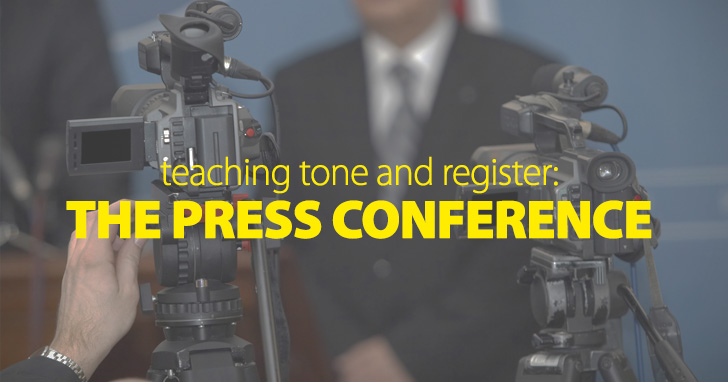Game On: How to Design Realistic ESL Business Scenarios


This often results in short, choppy utterances which might seem efficient, but which lack idiomaticism and can sometimes come across as impolite. To help my ESL Business students grapple with these concepts in more detail, I arrange a fictitious Press Conference, where we practice different styles and registers of question forms and generally give the spokesperson a hard time. It’s good fun, practices lots of useful language, and shed light on what is, for many, a tricky corner of language use.

Press Conferences are at their most enjoyable when there’s a scandal in the wind. I invent companies and different types of wrongdoing, depending on the level of the students, and the content of our business course thus far. Here is one of my favorites, delivered either as a reading, or as a listening exercise:
Faber is a well-known and respected brand of medical equipment. Founded in 1978, the company has offices in six countries and a factory in Pakistan. It has contracts with the National Health Service in Britain, and also three private healthcare companies in Europe. Recently, the company hit some problems related to the ethics of its management, and action is needed to protect the company.
I normally ask some check questions about the NHS, and elicit examples of unethical business practices.
Then, we move onto three serious allegations against Faber.
Obviously, the company must make some kind of public statement to defend itself against these allegations. Given that I want all of my students to practice the question forms, I tend to take the role of the Faber spokesperson, but it’s possible to divide the class in two, with one side defending Faber and the other asking increasingly pointed and accusatory questions.
I brainstorm with the students those aspects of question forms which change the register, or level of politeness. We’re aiming for these details:
I then provide five ‘lightweight’ questions - unchallenging, meek queries which one would deliver in a polite tone - and ask the students to design stronger, tougher (even meaner) questions on the same topic:
Lightweight / Polite / Unchallenging
Some good examples of the questions my students composed are:
Medium-weight / Fairly polite / Some pressure
Heavy-Weight / Not polite / Serious pressure
In teams, the journalists prepare these questions, deciding on how strongly they intend to press each point. When everyone is ready…
This is great fun, but rather like facing a shooting gallery, especially with an experienced ESL Business class! The teacher (or Faber representative) attempts to defend the company record, explaining that the journalist is mistaken and that the company is following all local ethics regulations, that the accusations of nepotism are merely a case of sour grapes, and that there’s nothing at all to the rumors of insider trading. The students pepper the spokesperson with questions, ramping up the strength as the Press Conference continues, and piling on more pressure in the hopes of forcing a mistake or confession.
Register is always relevant and useful, as are the different types of question forms. Working in groups requires explanations, discussions and compromise. And the Press Conference itself, frequently hilarious as the poor spokesperson is battered from all sides, is a terrific exercise in using tone and pace when speaking, listening to others, and (for the spokesperson) responding to the impossible. I recommend you give this a try if you’re ever working with an advanced business group.